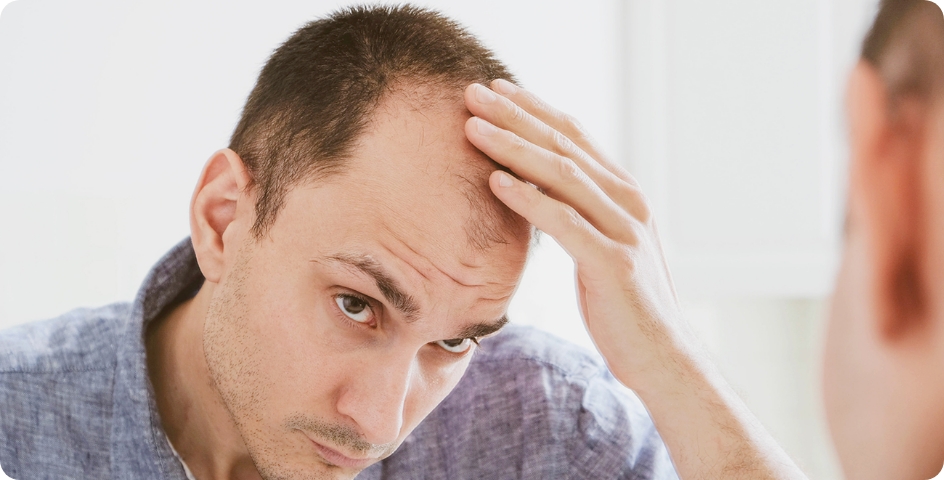
Hair Loss After Bariatric Surgery
Weight loss surgery, known also as bariatric surgery, is an essential treatment for obesity and has a great positive effect on the person’s physical and psychological health. But, such surgeries are not free of complications and side effects. One of these is hair loss after bariatric surgery.
The hair loss associated with weight loss surgery is called telogen effluvium and has to do with the normal hair growth cycle. It often starts abruptly and very seldom lasts longer than 6 months. Human hair has a two-stage growth cycle: the growth phase is called anagen and 90% of our hair follicles are in this phase at any given time. The resting phase is called telogen, which lasts about 2 to 6 months, with an average of 3 months. About 10-15% of our hair is in the resting phase at any given time.
It is also known that telogen effluvium has to do with stress on the body and hormonal changes that can occur. Due to stress, more hair follicles can enter into the resting phase. This is important because the hair in the resting phase at the time of bariatric surgery is most likely the hair you will shed. This is why your hair sheds between 2 to 6 months after surgery (usually about 3 to 4 months). When the hair starts to grow again the old hair follicle is released and you lose hair. Sometimes the hair can come out before new hair grows.
What Causes Hair Loss After Surgery?
Although it’s not known exactly why weight loss surgery could potentially cause hair loss, experts believe that abrupt nutritional changes are partly to blame. Bariatric surgeries reduce the size of the stomach and limit the amount of food intake, some procedures even reduce the number of nutrients that can be absorbed by the body. Thus, if the body must choose between feeding nutritional stores to hair follicles or to vital organs such as the heart and brain to keep them functioning, the follicles will go without.
Common reasons for telogen effluvium include, but aren’t limited to:
Major surgery
Physical trauma
Acute weight loss
Anorexia
Crash dieting
Severe, chronic illnesses
Bariatric surgery patients have at least two of these triggers, including major surgery and acute weight loss, which is why hair loss is common after weight-loss operations.

What Not to Do While Hair Loss After Bariatric Surgery
Within the 12 to 18 months after surgery, it is important that you do not undertake any over-the-counter, medical, or surgical interventions for your hair loss without speaking to your surgeon. After weight loss surgery, hair loss is temporary, and trying to slow it with any kind of intervention other than focusing on your recovery can be counterproductive.
There’s not much to worry about when it comes to hair thinning. There’s a good chance it will happen after weight loss surgery, and taking it in stride will lead to a more enjoyable aftercare process during which time you can focus on your new lifestyle and weight loss.

Prevent Hair Loss After Bariatric Surgery
To reduce the amount of hair loss you experience after bariatric surgery, prevent it from worsening, and promote regrowth, here are a few things you can do.
Have Your Vitamin and Mineral Levels Checked Before Surgery
Experts recommend that all patients are prescreened for nutrient deficiencies before surgery, namely for thiamin, vitamin B12, folate, iron, vitamins A, D, E, K, zinc, and copper. This helps identify areas of deficiencies and corrects them before bariatric surgery, to give you the best outcome. Being obese increases your risk for micronutrient deficiencies, so it’s really important to understand your nutritional status before weight loss surgery.
Begin a Multivitamin Regimen Before Surgery
Consistently taking a multivitamin prior to weight loss surgery helps to correct any deficiencies that have been identified, and prevent further deficiencies from developing. The act of taking a multivitamin will also help you form healthy habits, especially if you make a point to take it around the same time every day. Taking supplements is a critical practice for life after bariatric surgery.
Continue Taking a Multivitamin Exactly As Prescribed After Bariatric Surgery
Taking a multivitamin will continue to be a daily, lifelong habit after bariatric surgery. For the first few months, it’s best to take a chewable or liquid multivitamin, after which you can switch to a capsule form. Follow the guidance of your healthcare team regarding what kind of multivitamin to use, to make sure it’s well tolerated and adequately meets your nutrient needs. Ideally, you should look for multivitamins that have been verified to contain what is indicated on the ingredient label, and in the amounts claimed.
Add Protein to Every Meal
Protein after bariatric surgery is imperative for recovery, healing, sustained weight loss, and prevention of muscle loss. Some sources of high-quality protein include eggs, fish, poultry, legumes, or dairy, as long as you can tolerate this food well. Your stomach size is smaller following bariatric surgery, making it important to eat a solid protein source at every meal throughout the day.
Generally, protein intake should be between 60-100 grams per day, but your surgical team and registered dietitian will offer personalized guidance for your recovery. It’s possible that supplemental protein drinks will be recommended to help you meet your demands temporarily.
Add a Wide Variety of Vitamins and Minerals to Your Diet Using Whole Foods.
While supplements are crucial after bariatric surgery, it’s all suggested to eat a nutrient-dense diet including whole foods. Good sources of iron include tofu, dark leafy greens, lentils, turkey, or chicken. You should enhance iron absorption, and pair iron-rich foods with good sources of vitamin C, like citrus fruits, berries, bell peppers, and dark leafy greens. Zinc-rich foods include beans, dairy, eggs, and meat. Also, protein is found in meat, fish, eggs, dairy, and plant-based sources like beans, peas, soy foods, and lentils.
When Should You Worry About Hair Loss After Bariatric Surgery?
If your hair loss has lasted for more than 12 months
If your hair loss started later than 6 months after bariatric surgery
If you are finding it difficult to eat sufficient quantities of various food
If you have not followed the advice for vitamin replacement therapy
If your blood tests indicate an iron, zinc, or protein deficiency
If you have lost weight significantly faster than normally
If you have signs indicative of other possible deficiencies
If you have been diligent in following the bariatric diet and taking the surgeon’s recommended vitamins and supplements but continue to experience excessive hair loss, you can consult your primary care physician. Issues related to the thyroid, hormones, and other conditions can be the root cause or add to the hair loss issue. Your doctor can run tests on your hair to help determine what can be causing the problem.
The Study of Hair Loss After Bariatric Surgery
A recent study published in the Journal of Clinical Dermatology investigated hair loss patterns in individuals who underwent bariatric surgery. The study, which followed a cohort of 200 patients, found that telogen effluvium, the hair loss condition commonly associated with weight loss surgery, was a common occurrence in the first few months post-surgery. The study also emphasized the role of nutritional deficiencies, highlighting that patients with pre-existing nutrient deficiencies were more prone to experiencing prolonged hair loss. These findings underscore the importance of addressing nutrient deficiencies before and after bariatric surgery to mitigate hair loss complications.
Conclusion About Hair Loss After Bariatric Surgery
Hair loss after weight loss surgery is a common side effect due to the change in the patient’s lifestyle and food intake. However, this condition and be somehow prevented by taking the abovementioned measures. If you still have any questions or concerns about hair loss after weight loss surgery, do not hesitate to contact Healthy Türkiye.



